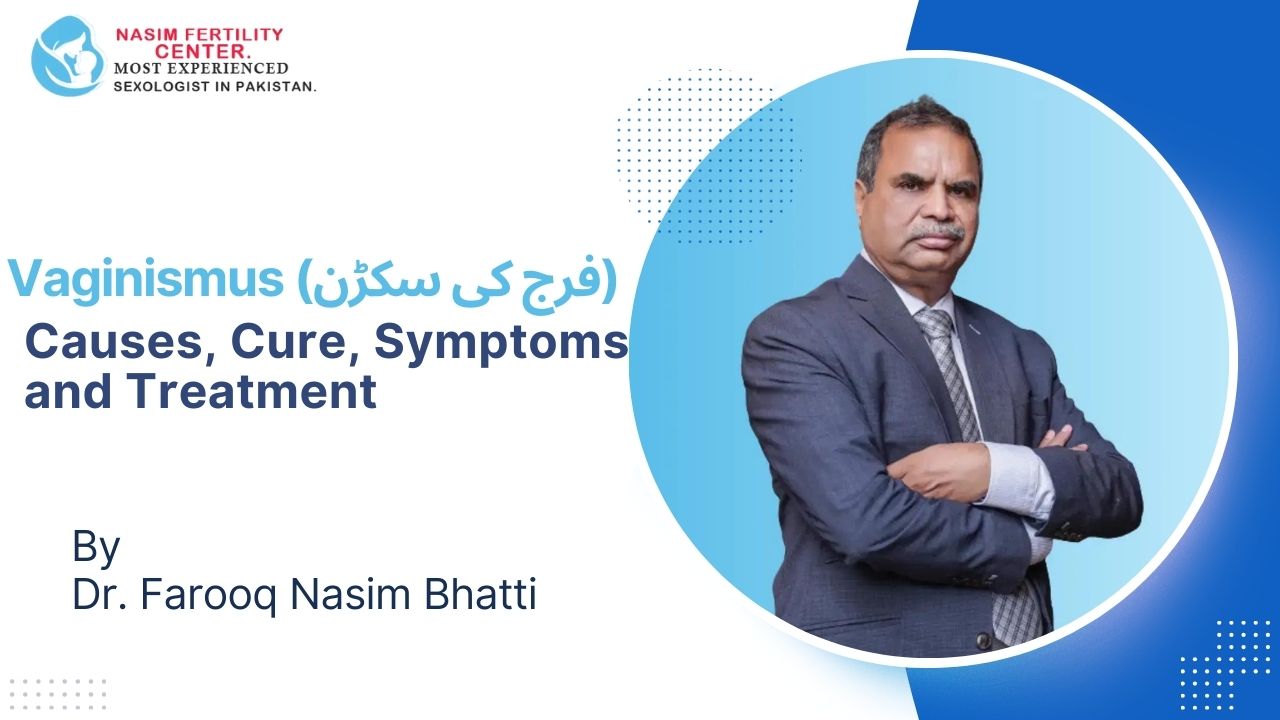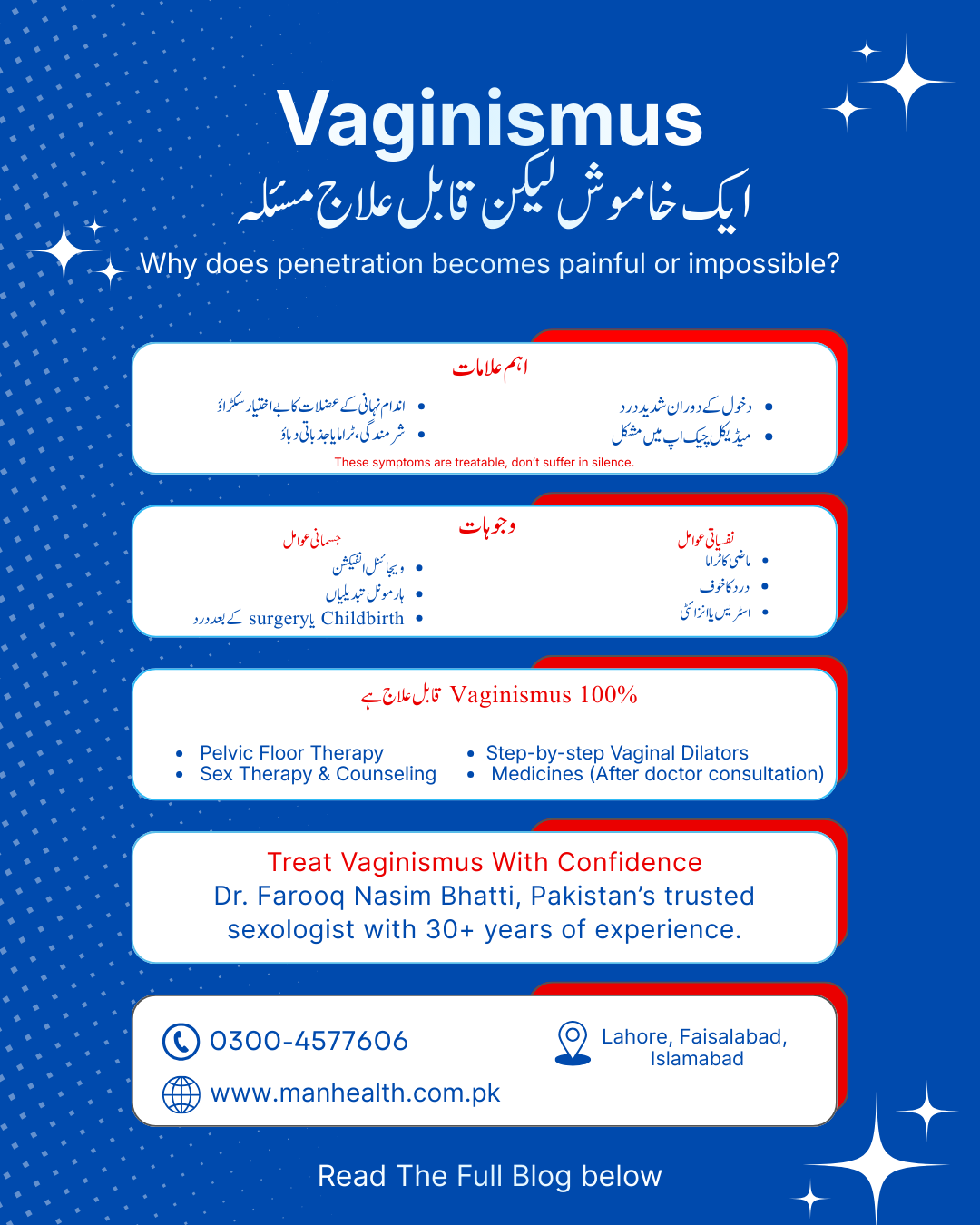
Vaginismus is a condition where there is involuntary tightening of the vaginal muscles, making sexual intercourse, gynecological exams, or even tampon insertion painful or impossible. This condition is often misunderstood and underdiagnosed, affecting the physical and emotional well-being of individuals who experience it.
What is Vaginismus?
Vaginismus is a physical response to emotional, psychological, or physical triggers. It involves an automatic spasm in the vaginal muscles, particularly the pubococcygeal muscles. This reflex makes penetration difficult and can be accompanied by fear or discomfort, contributing to the pain.
Painful or Impossible Intercourse? It Could Be Vaginismus
Get gentle, expert care from Dr. Farooq Nasim Bhatti—Pakistan’s trusted specialist in female sexual health.

Vaginismus Meaning in Urdu
In Urdu, Vaginismus can be translated as “فرج کی سکڑن یا وجائنا کے عضلات کا بے اختیار سکڑنا”، which refers to the involuntary contraction of vaginal muscles, often causing discomfort or pain during penetration.
Types of Vaginismus
Vaginismus can be classified into different types based on its onset and underlying causes:
- Primary Vaginismus
Occurs when penetration has never been possible due to pain or discomfort. This form is typically noticed during initial sexual activity, tampon usage, or pelvic exams. - Secondary Vaginismus
Develops after an individual has previously experienced pain-free penetration. Causes may include trauma, childbirth, or hormonal changes. - Situational Vaginismus
Occurs only in specific scenarios, such as with a particular partner or during medical examinations. - Psychological Vaginismus
Stems from emotional or mental triggers, such as anxiety, past trauma, or cultural conditioning.

Symptoms of Vaginismus
Recognizing the symptoms of vaginismus is critical for seeking timely intervention. Common symptoms include:
- Pain During Intercourse
Often described as a burning or stinging sensation during penetration. - Inability to Penetrate
Difficulty or complete inability to insert tampons or undergo pelvic exams. - Muscle Tightness
Noticeable spasms or involuntary tightening of the vaginal muscles. - Anticipatory Anxiety
Fear or dread of penetration, leading to avoidance behaviors. - Physical Discomfort
Generalized pelvic discomfort or soreness, even without an attempt at penetration. - Emotional Impact
Feelings of embarrassment, frustration, or a sense of inadequacy.
Causes of Vaginismus
Vaginismus has multifactorial causes, which can be broadly categorized into physical, psychological, and cultural factors:
Psychological Causes
- Past sexual abuse or assault
- Performance anxiety or fear of pain
- Stress or mental health conditions like depression
Physical Causes
- Chronic pelvic pain conditions (e.g., endometriosis or vaginitis)
- Hormonal changes, especially post-menopause
- Scarring from childbirth, surgery, or trauma
Cultural and Social Influences
- Strict upbringing with negative attitudes toward sex
- Fear of losing virginity
- Societal taboos or misinformation about sexual health
Also Read: First Time Blood after Intercourse
Vaginismus Can Be Treated—You Don’t Have to Suffer Silently
Take the first step toward pain-free intimacy with a confidential consultation from Dr. Farooq Nasim Bhatti.

Treatment Options for Vaginismus
Treatment for vaginismus is highly individualized and often requires a multidisciplinary approach. Common treatment strategies include:
Pelvic Floor Therapy
Physical therapy aimed at relaxing and strengthening the pelvic floor muscles.
Psychotherapy and Counseling
Cognitive Behavioral Therapy (CBT) can help address anxiety, trauma, or misconceptions about sex. Dr. Farooq Nasim Bhatti provides Sex Therapy and Relationship Counselling therapy.
Vaginal Dilators
Gradual insertion of dilators to desensitize the vaginal muscles and reduce spasms.
Sexual Education
Providing accurate information about anatomy and dispelling myths surrounding intercourse.
Medical Treatments
There are different medicines that are perfect to cure the Vaginismus and you can use medicines after consulting expert Sexologist.
Alternative Therapies
Hypnotherapy, mindfulness, or yoga can help reduce stress and improve body awareness.
Why Choose Dr. Farooq Nasim Bhatti for Vaginismus Treatment?
Dr. Farooq Nasim Bhatti is a pioneer in the field of sexology in Pakistan. With credentials MBBS, FAACS (USA), Diplomate: The American Board of Sexology (USA), CST, HSC (Hong Kong), CART (MALAYSIA), CART (CHINA), Dr. Farooq Nasim Bhatti specializes in diagnosing and treating conditions like vaginismus. His patient-centric approach, combined with state-of-the-art techniques, ensures effective and compassionate care.
Conclusion
Vaginismus is a challenging condition that can significantly impact an individual’s physical and emotional health. However, with the right combination of medical, psychological, and educational interventions, it is entirely treatable. Recognizing the symptoms and seeking professional help early can pave the way for recovery and a fulfilling life.
Frequently Asked Questions
How common is vaginismus?
Studies estimate that 1–7% of women globally experience vaginismus, but many cases go unreported due to stigma.
Can vaginismus affect pregnancy?
While it may hinder natural conception, assisted reproductive techniques like IVF can be effective.
Is vaginismus a lifelong condition?
No, with appropriate treatment, you can easily overcome vaginismus.
What is the most effective treatment for vaginismus?
A combination of therapy, counseling, and medicine with consultation from expert can yields the best results.
Can vaginismus recur?
Yes, it can recur if underlying triggers are not addressed. Ongoing therapy can help prevent recurrence.
Disclaimer
This information is for educational purposes and not the treatment. For treatment, you need to consult the doctor.

Dr. Farooq Nasim Bhatti (MBBS, FAACS – USA, Diplomate: American Board of Sexology, CST, HSC – Hong Kong, CART – Malaysia & China) is a qualified medical sexologist with 30+ years of experience. He has presented 21+ research papers internationally and treats sexual dysfunction through sex therapy, counseling, and pharmacotherapy to restore natural sexual function without temporary medication.

Regain Confidence with Our ED Solutions
Explore effective treatments for erectile dysfunction. Take charge of your intimacy today.


